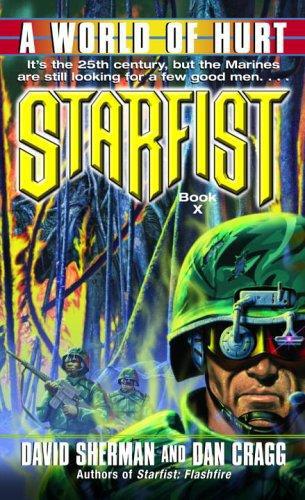
Starfist: A World of Hurt PDF
Preview Starfist: A World of Hurt
In Sherman and Cragg's 10th superior military SF novel (after 2003's Starfist: Lazarus Rising), the long-suffering troops of the 24th Marine Fleet Initial Strike Team (aka FIST) take on their alien nemesis, the malignant, acid-spewing Skinks, on a planet whose colonists have left most of it unexplored. Unbeknownst to the FIST team, a local system government, whose military chief decides that it's immoral to have all these warships and never use them, decides to invade the planet at about the same time. The results are unexpected, to say the least. There are basically two types of military SF: the first realistically depicts the horrors of war, while the second explores (usually affectionately and often in an idealized way) the sociology of the military unit. Most writers in the subgenre do one or the other well, but Sherman and Cragg, both retired career noncommissioned officers, excel at uniting these two approaches. Injecting freshness into a situation that was clichéd even in the days of Hugo Gernsback, they show how training and esprit de corps can overcome the most terrifying encounters. In contrast, the authors treat the stupidity of the book's comic-opera human antagonists with Swiftian invective. You don't have to be a military SF buff to appreciate this entertaining and instructive exercise.
The best-selling military sf series Starfist continues with a volume less intense than Lazarus Rising [BKL N 1 03] but in its own way intelligent and agreeable. The planet of Maugham's Station reports an alien life form that uses jets of acid as weapons, which is the hallmark of the deadly Skinks. The 34th FIST is sent out, with Charlie Bass still commanding a platoon, though, as a newly commissioned ensign, with a certain amount to learn about how to lead as an officer instead of a gunnery sergeant. Meanwhile, the navy of the planet We're Here decides that Maugham's Station is involved in an ore piracy scheme that they intend to suppress as quickly and fiercely as possible. It turns out that Maugham's Station is a base for neither pirates nor Skinks, and Charlie Bass is likely to be as good as a junior officer as he was as a senior NCO. Meanwhile, We're Here's armed forces resemble the Keystone Kops on a bad day, which keeps the body count low. Roland Green
Copyright © American Library Association. All rights reserved
